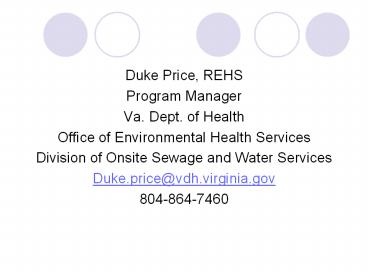Duke Price, REHS - PowerPoint PPT Presentation
Title:
Duke Price, REHS
Description:
Title: Wells & Septic Systems Author: Donald J. Alexander Last modified by: cbuttery Created Date: 4/26/1999 11:50:03 AM Document presentation format – PowerPoint PPT presentation
Number of Views:87
Avg rating:3.0/5.0
Title: Duke Price, REHS
1
- Duke Price, REHS
- Program Manager
- Va. Dept. of Health
- Office of Environmental Health Services
- Division of Onsite Sewage and Water Services
- Duke.price_at_vdh.virginia.gov
- 804-864-7460
2
The Basics
Private water supplies and onsite sewage systems
1. How do we regulate? Why do we
care? 2. What is the regulatory program? 3. Who
is regulated (stakeholders)? 4. What is the role
of DEQ and VDH? 5. How do we solve problems?
3
The Not-So Basics (subtleties, politics,
philosophy, social responsibilities, etc.)
Private water supplies and onsite sewage systems
1. Planning and zoning tool (Where to
Develop?) 2. Building Permit Program (What
can develop?) 3. Mass Sewage Disposal
Systems 4. Cutting-edge Technology 5. Money
Property Rights
4
How do we regulate private water sewage?
- Title 32.1-164 of the Code of Virginia
- The Private Well Regulations (1990)
- The Sewage Handling and Disposal Regulations
(1972, 1982, 1989, 2000) - The Discharge Regulations (1992)
- The AOSE Regulations
- Guidance, Memoranda, Policy
- The Indemnification Fund
5
Who are the stakeholders?
6
Why do we regulate? (The Hydrologic Cycle)
7
Whats in Wastewater?
8
Whats in Wastewater?
1. Water (99 Percent) 2. Organics
Nutrients 3. Fats, Oils, and Grease (FOG) 4.
Inorganics and other solids (Hair,
cloth) 5. Virus and Bacteria 6. Heavy Metals
7. Ammonium, Phosphates
9
Why do we care?
Groundwater may be affected by.
VIRUSES
1. Over 100 enteric viruses excreted in the
feces of man. 2. Filtration by the soil is
minimal because of their small size (lt 250
nm). 3. Can initiate significant waterborne
disease.
10
Groundwater may be affected by.
BACTERIA
1. Waterborne outbreaks from Shigella,
Salmonella, Campylobacter, E. coli, and
others. 2. Typical concentration of 4.2 x 107
organisms in STE 3. Adsorption and filtration
reduce survival rates (well- drained fine medium
textured soils helps greatly). 4. Movement in
coarse textures or high water tables may be
significant.
11
HOW DO WE PROTECT GROUNDWATER AND PUBLIC HEALTH?
The Site Evaluation
LANDSCAPE POSITION SOIL TYPE VERTICAL
OFFSET DEFINE SITE
12
Creeping Failure
13
(No Transcript)
14
System Failure
15
(No Transcript)
16
(No Transcript)
17
Current Regulatory Paradigm
Application
Site Evaluation
- All steps treated equally
- No risk assessment
- No performance monitoring
- No maintenance program
System Design
Permit Issued
System Construction
Inspection
Operation Permit
Failure
No Risk
Risk
(15 days)
First Flush
0
30
Timeline Years
18
Regulatory Adoption
- Stakeholder ideas and comments
Regulatory Change
19
The Stakeholder Input Process
- Virginia Association of Professional Engineers
- Virginia Association of Professional Soil
Scientists - Virginia Homebuilders Association
- Virginia Association of AOSEs
- Virginia Onsite Wastewater Recycling Association
- Virginia Environmental Health Association
- Virginia Department of Health Employees
- Virginia Academic Community
- Virginia Septic Contractor Community
20
(No Transcript)
21
(No Transcript)
22
- VDH
- Public health
- Due diligence
- Regulate private, onsite
- Public Water Supplies
- DEQ
- Primacy
- Spills
- State Water Control Bd.
- Large discharges
23
Air Check Virginia Air Quality Brownfield/Land Renewal Chesapeake Bay Program Citizen Monitoring Clean Marina Program Computer Electronics Recycling Construction Assistance Environmental Education Enforcement Environmental Excellence Environmental Impact ReviewFederal Consistency Environmental Management eProcurement Federal Facilities Ground Water Protection Innovative Technology ISO 14001 Oyster Heritage Program Ozone and Particle Pollution Monitoring Petroleum Programs Pollution Prevention Power Plants Recycling Litter Prevention SARA Title III Small Business Assistance Superfund Total Maximum Daily Loads Toxics Release Inventory Virginia Coastal Program Vehicle Emissions Inspections Virginia Naturally Voluntary Remediation Waste Management Waste Tires Wastewater Engineering Wastewater Treatment Water Quality Water Resource Management
DEQ
24
Drinking Water Office of Drinking Water - Source
Water Assesment Program - Very Small Water
Systems - Drinking Water State Revolving Fund
Program Epidemiology Epidemiology
ProgramImmunizations Waterborne Hazards Control
Tuberculosis ControlSTD/AIDS - AIDS Drug
Assistance Program - Chlamydia Prevention
Program - HIV Prevention Program - Perinatal
Hepatitis B Prevention - Virginia Vaccines for
Children ProgramHealth Hazards Control -
Radiological Health Program - Toxic
SubstancesBedding and Upholstery
Inspection Emergency Emergency Preparedness and
ResponseEmergency Medical Services
VDH
25
VDH
Environmental Health Office of Environmental
HealthFood and General Environmental
ServicesOnsite Sewage and Water
ServicesShellfish Sanitation Wastewater
Engineering Marina ProgramRestaurant Inspections
26
Solving Problems
- Hearings, appeals
- Research Va. Tech
- Education public
- Training staff
- Assessment need more
- Surveillance
27
Questions on The Basics
Private water supplies and onsite sewage systems
1. Why do we regulate? Why do we
care? 2. What is the regulatory program? 3. Who
is regulated (stakeholders)? 4. What is the role
of DEQ and VDH? 5. How do we solve problems?
28
Questions on the Not-So Basics
Private water supplies and onsite sewage systems
1. Planning and zoning tool (Where to
Develop?) 2. Building Permit Program (What
can develop?) 3. Mass Sewage Disposal
Systems 4. Cutting-edge Technology 5. Money
Property Rights































